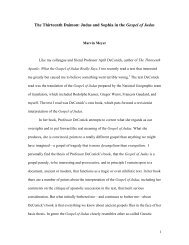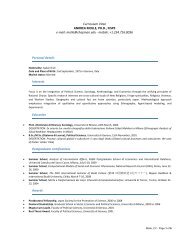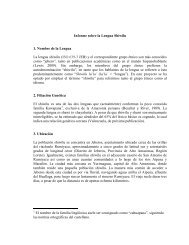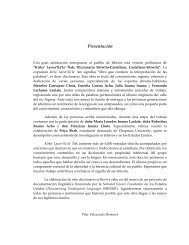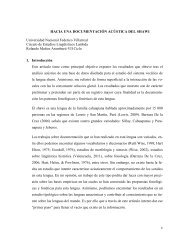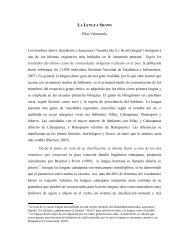“Surplus Humanity” and the Margins of Legality - Chapman University
“Surplus Humanity” and the Margins of Legality - Chapman University
“Surplus Humanity” and the Margins of Legality - Chapman University
Create successful ePaper yourself
Turn your PDF publications into a flip-book with our unique Google optimized e-Paper software.
Do Not Delete 12/12/2010 7:34 PM<br />
36 <strong>Chapman</strong> Law Review [Vol. 14:1<br />
C. The Neoliberal Reordering<br />
In this general context, India took a turn to neoliberal<br />
restructuring in <strong>the</strong> early 1990s, ushering in an era <strong>of</strong><br />
―liberalisation-privatisation-globalisation,‖ 233 marking ―a fundamental<br />
transformation <strong>of</strong> India‘s economic strategy.‖ 234 It was<br />
envisaged that <strong>the</strong> economy ―would be transformed in its basic<br />
orientation in a matter <strong>of</strong> a few years.‖ 235 This entailed rapidly<br />
instituted deregulation, privatization, curtailment <strong>of</strong> food subsidies,<br />
cost recovery <strong>of</strong> public services, <strong>and</strong> liberalization <strong>of</strong><br />
trade. 236 Indian markets were opened up to an influx <strong>of</strong> capital,<br />
goods, <strong>and</strong> services. Foreign capital investment soared, as did<br />
<strong>the</strong> stock market <strong>and</strong> <strong>the</strong> real estate market. High, though<br />
doubtful, growth rates, based largely on performance <strong>of</strong> <strong>the</strong><br />
service sector were sustained. 237 A thorough empirical study<br />
finds that <strong>the</strong>se rates <strong>of</strong> growth are not associated with<br />
liberalization <strong>of</strong> <strong>the</strong> domestic economy <strong>and</strong> international trade,<br />
but are a case <strong>of</strong> sustained growth that began a decade earlier. 238<br />
This presents ―an important counterexample to <strong>the</strong> dominant<br />
orthodoxy.‖ 239 In addition, accelerated remittances by skilled <strong>and</strong><br />
unskilled labor buoyed foreign exchange reserves.<br />
With <strong>the</strong> neoliberal turn in public policies, corporate capital<br />
assumed political <strong>and</strong> moral sway over <strong>the</strong> social formation. This<br />
hegemony was deployed to influence governmental decisions ―not<br />
through electoral mobilisation <strong>of</strong> political parties <strong>and</strong> movements<br />
but largely through <strong>the</strong> bureaucratic-managerial class, <strong>the</strong><br />
increasingly influential print <strong>and</strong> visual media, <strong>and</strong> <strong>the</strong> judiciary<br />
<strong>and</strong> o<strong>the</strong>r independent regulatory bodies.‖ 240 The bureaucraticmanagerial<br />
class now st<strong>and</strong>s subordinated to corporate capital. 241<br />
The latter is now in a position to set <strong>the</strong> terms <strong>of</strong> <strong>the</strong> political<br />
field to which o<strong>the</strong>r social groups are constrained to respond.<br />
233 Mary E. John & Satish Deshp<strong>and</strong>e, Theorising <strong>the</strong> Present: Problems <strong>and</strong><br />
Possibilities, 43 ECON. & POL. WKLY. 83, 84 (2008). See also Kamal Nayan Kabra, Indian<br />
Planning <strong>and</strong> Liberalisation, 31 ECON. & POL. WKLY. 2740, 2740–41 (1996); Kuldeep<br />
Mathur, Neo-liberal Agenda <strong>and</strong> Study <strong>of</strong> Institutions, 1 REV. OF DEV. & CHANGE 167, 175<br />
(1996).<br />
234 Ashutosh Varshney, Mass Politics or Elite Politics? India‘s Economic Reforms in<br />
Comparative Perspective, in INDIA IN THE ERA OF ECONOMIC REFORMS 222, 230 (Jeffrey D.<br />
Sachs et al. eds., 1999).<br />
235 Jeffrey Sachs et al., Introduction, in INDIA IN THE ERA OF ECONOMIC REFORMS,<br />
supra note 234, at 1, 13.<br />
236 Id. at 13–16.<br />
237 Prabhat Patnaik, The Meaning <strong>of</strong> Contemporary Globalization, in CONTESTED<br />
TRANSFORMATIONS, supra note 35, at 7.<br />
238 MCCARTNEY, supra note 203, at 236.<br />
239 Id. at 235.<br />
240 Partha Chatterjee, Democracy <strong>and</strong> Economic Transformation in India, 43 ECON. &<br />
POL. WKLY. 53, 57 (2008).<br />
241 Id. at 57–58.




